Acer Aspire S7 Ultrabook: Acer’s Best Foot Forward
by Jarred Walton on January 7, 2013 4:30 AM EST- Posted in
- Laptops
- Acer
- Intel
- Ivy Bridge
- Aspire S7
- Ultraportable
- Ultrabook
Windows 8 Tablet Performance
As noted on the previous page, I’m going to run some of our hybrid laptops like the Aspire S7 through the tests we’re using on tablets. Much ado has been made about the performance of the latest ARM-based SoCs, and I think it’s good to put things in perspective. There are two major items of note: first is that battery life is quite a bit worse with Ivy Bridge compared to Atom and ARM SoCs; the second is that performance is nearly an order of magnitude faster in many tests.
For the tests below, note that I used the same Internet benchmark that we use for tablets, which is far less strenuous than our laptop Internet testing. In fact, the difference in battery life between our “webtest4d” and our idle battery life test is only a few minutes. Display brightness also seems to have a relatively minor impact on battery life with the S7, as it only gains an extra 5-20 minutes going from 200 nits to 100 nits brightness (depending on the test).
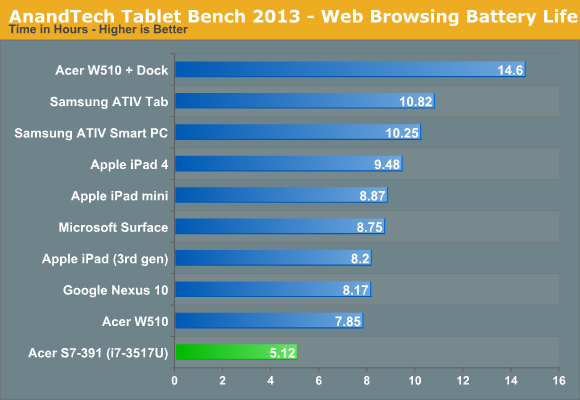
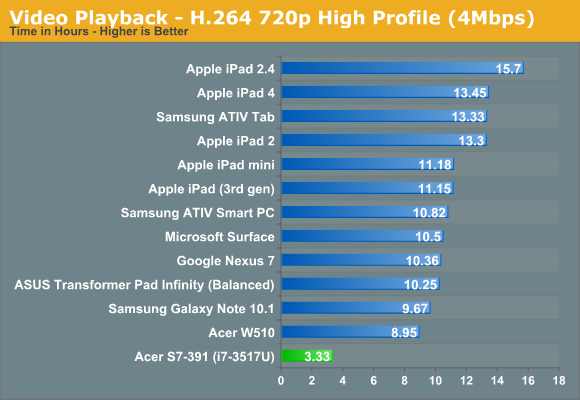
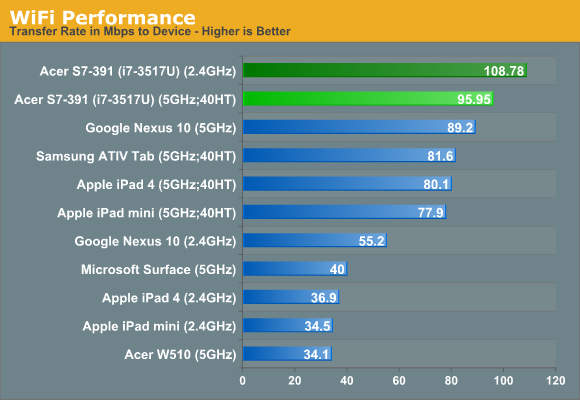
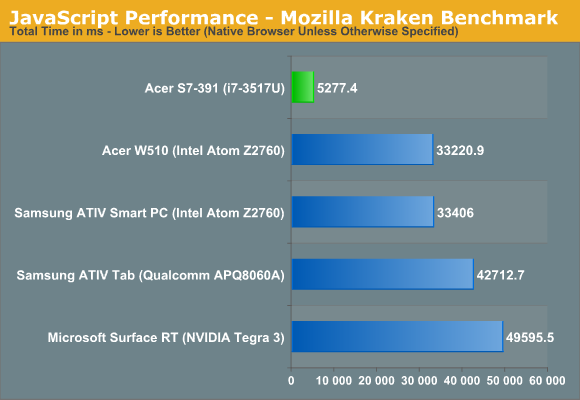
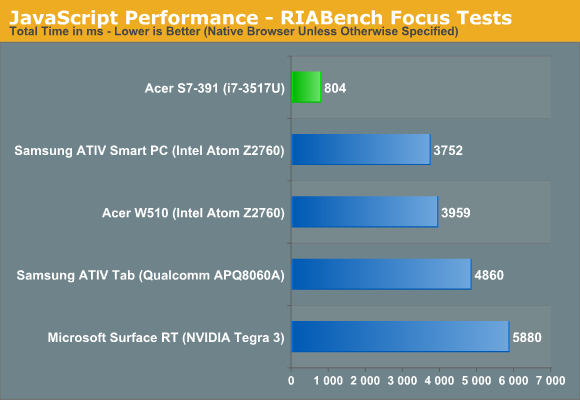
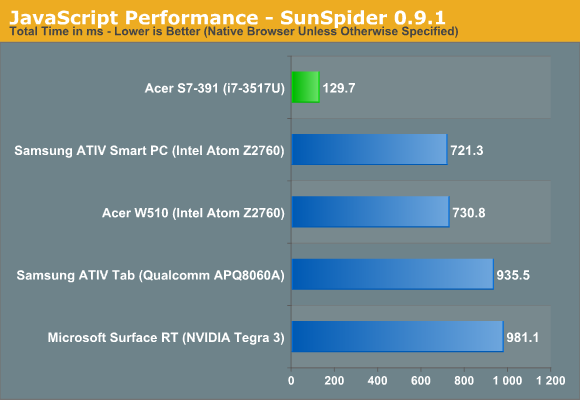
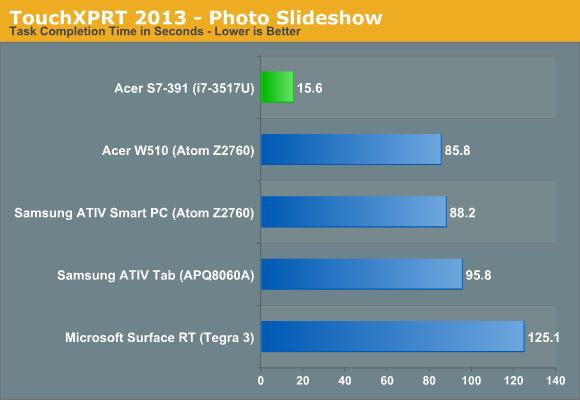
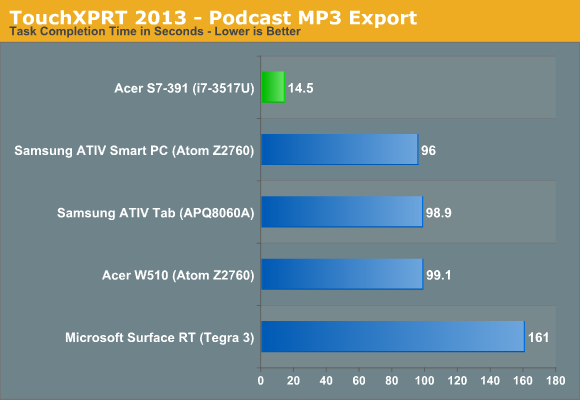
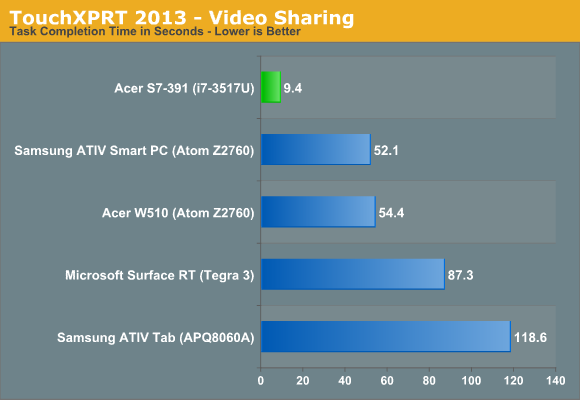
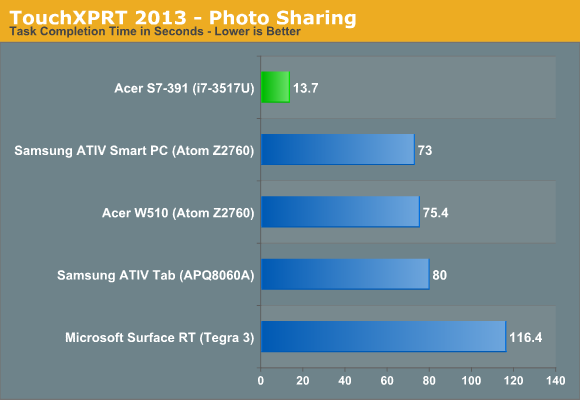
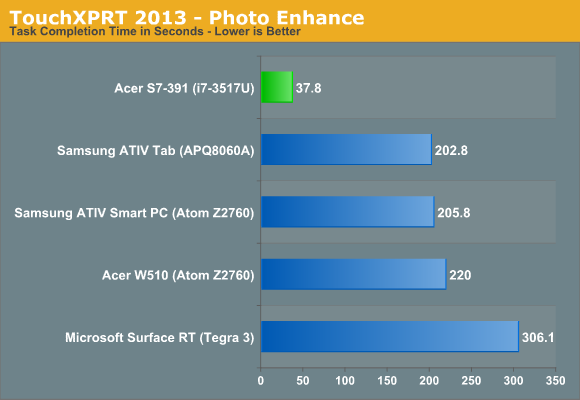
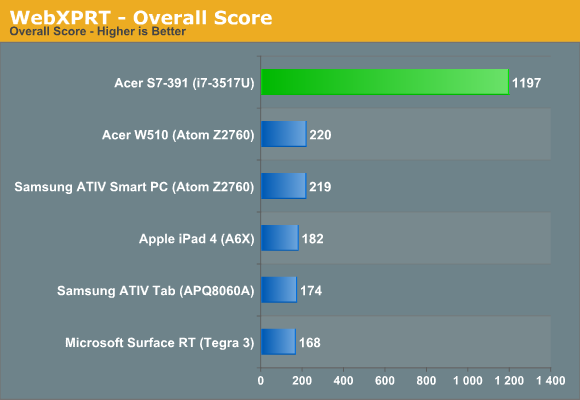
When people say that tablets are taking over for laptops, this is where we continue to fall short, and we’re not even talking about top-end laptop performance here. Bring in Haswell in the next few months and we might even see much of the battery life deficit disappear. Simply stated, ARM tablets will need much more than a doubling of performance to come anywhere near the performance level of Intel’s current ULV processors. Again, depending on what Intel manages with Haswell, it’s much more a question of whether tablets can become “fast enough” than whether they can actually catch Intel any time soon.
In terms of performance, the Aspire S7 is over 6x faster than the closest tablet in Kraken, 4.5x faster in RIABench, 5.5x faster in SunSpider, and basically 5.5x faster an all of the TouchXPRT/WebXPRT tests. In most tests, we’re looking at the Atom Z2760 as the runner up, but let’s focus on Tegra 3 just for a moment. There, Core i7-3517U is anywhere from 7-11x faster; Wayne needs to get here sooner rather than later.
It should go without saying that browsing in the Windows modern UI is smooth on the S7—though interestingly, while the touch screen interface scrolls nicely, using the touchpad to scroll around has some odd stuttering when you “coast”. Considering we have a laptop with four times as much RAM, a substantially faster SSD setup, and all that processing power, the Modern UI never appears to have a problem even on HD 4000. That’s going to make things a bit interesting for the folks at AMD and NVIDIA, depending on how the new UI and apps catch on. Then again, that new UI deserves some commentary.
Thoughts on the Windows 8 UI Experience
At best, I have serious concerns with Windows 8's new UI, at least from a laptop/desktop perspective. I said as much several months ago, and the final release has done virtually nothing to assuage my concerns. Using a touch screen to browse around works well enough, sure, but reaching across the keyboard to do so feels awkward at best. Then there’s the crazy switch between the Modern UI and the Classic Desktop UI, and the touch screen feels all but useless in the latter.
For tablets and smartphones, I think the Windows 8 UI makes tons of sense, but as soon as you slap a keyboard and touchpad in front of the user, it’s a different experience. Windows CE and earlier iterations of Windows Phone felt like Microsoft was trying to cram a full-blown desktop OS onto a handheld device without doing proper optimizations. Windows 8 feels like they’re now going the other way.
As for the Aspire S7, it does okay at straddling the line between the tablet and laptop worlds, but while I thought it was somewhat novel at first, when I got time with a Dell XPS 12 I really started to feel the faults with the S7 approach. Dell’s XPS 12 is much thicker, true, but even though the weight makes for a less than ideal tablet experience, it’s still a better tablet than the S7. Lenovo’s Yoga is another alternative, but I’m still iffy on the idea of having the keyboard exposed in tablet mode—I understand the keys all deactivate, but it just seems like a great way to get a lot of extra dirt into your keys over time. Acer has decided that instead of trying to make a true tablet-like experience, they would allow you to open the hinge 180 degrees and lay the S7 flat. I guess that can work, but in reality I almost never put a tablet flat on a table/desk; I hold it in my hands while I lounge on the couch, and the S7 doesn't feel natural in that environment.










53 Comments
View All Comments
cknobman - Monday, January 7, 2013 - link
Hard to sell at such a high price when your competitors sell comparable (or better) items $500+ cheaper.The Asus UX31A is one of my favorites right now. 1080p touch screen, all aluminum build, core i5, 128gb SSD and
UNDER $1100!!!!!!!!!!!!!!!!!!!!!!!!!
I am toying with getting this right now from best buy: http://www.bestbuy.com/site/Asus+-+Ultrabook+13.3%...
Zanegray - Monday, January 7, 2013 - link
I have a ux31a-ab71 (same as db71 except a smaller ssd) and I LOVE the thing. I don't care for Windows so I put Linux on it and find it my favorite computing device. Under my usage the battery also last for 2 to 3 days at a time. It is snappier than I ever expected and the aluminum case is awesome looking.To summarize... It's just plain sexy.
Paid just over 1000 dollars for it on black Friday too :-)
ironargonaut - Monday, January 7, 2013 - link
Is an IPS screen that fantastic on a 14in laptop that I should pay $700 more?kyuu - Monday, January 7, 2013 - link
You're not paying $700 for the IPS screen.drjacko - Monday, January 7, 2013 - link
Original: "I can’t understate how impressively thin this thing is"But the article is very good as a review as well as a commentary of the path taken by Acer.
Would you have considered a side by side shots against MB counterparts and previous version of Acer's ultrabook?
rarson - Monday, January 7, 2013 - link
For the life of me, I can't understand why someone would want one of these over a normal laptop. Am I the only person who cannot stand ultra-thin (and ultra-flimsy) notebooks? I feel like I'm going to break the thing just by opening it up. A crappy keyboard, touchscreen, and absurd pricing makes this about as useful as a Surface tablet. Which is to say, pretty f#&@ing useless.Even if you do like the ultra-thin junk, I still don't see why you'd want to pay such a premium for a touchscreen on a laptop, although I suppose when your keyboard is that crappy, you'll be yearning for some other kind of input device.
If I want a consumption device, I'll buy a Nexus tablet or similar. If I want a computing device, then I'll buy a regular laptop. For the price of one of these, I could buy one of each and STILL save a chunk of change.
kyuu - Monday, January 7, 2013 - link
1) These devices are not "ultra-flimsy", despite being very thin. If you "feel" like you're going to break it, that's your problem. You remind me of my grandmother arguing that you have to drive a gigantic Oldmobile or an SUV to be safe because smaller cars don't "seem" like they could be as safe.2) If you don't see the value proposition in a device like this, then obviously it's not for you. I don't see the value proposition in buying a Mercedes, for example, but that doesn't mean they shouldn't be built.
Tech-Curious - Monday, January 7, 2013 - link
To be fair, your grandmother is right: all else being equal, a lighter car is less safe, possibly a lot less safe depending on the particulars.AnnoyedGrunt - Tuesday, January 8, 2013 - link
Except that all else isn't equal, is it? Cars today are much, much safer than they have ever been, and even a small, modern car would be much safer than Granny's Oldsmobile.As far as the ultra-thin laptops go, I'm not a huge fan, but I can understand how someone who travels would really like the smaller, more portable size. My wife has a Macbook Pro 15 (non-retina), and I have a Dell Precision M4600 for work, and those are reasonable sizes for me.
This Acer is interesting, very similar in cost to a Macbook Air, but with better specs in most areas. However, one thing the Macs have done MUCH better than Windows laptops is make the touchpad useful. I don't know if it's a combination of OSX and hardware, or better drivers, or what, but it is so much easier to use the touchpad on my wife's Macbook than the one on my Dell (and any other Windows laptop I've used). I don't feel the need to use a mouse on the Mac, but on the Dell I always feel handcuffed without it (and this is for things like MS Office, web browsing, etc.).
I would have liked to see some Macbook Air battery life results and performance results, since I feel that is one of the biggest competitors for the Acer.
Ovreall I'm happy to see some in the PC industry making products that move in the direction of quality rather than price. Once you get to the point where the price isn't as much of an issue (especially for something you'll be using for 4-5 years) the enjoyment of using something that has high-quality interface points (monitor, keyboard, etc.) quickly overcomes the cost difference. Still would prefer something a bit thicker with a better keyboard and more battery life, though.
-AG
Tech-Curious - Tuesday, January 8, 2013 - link
As to your first comment, I don't know that that's universally true. Sure, in general, a modern car will have safety advantages an older car doesn't -- but size does matter: Is a 2013 Smart Car as safe as granny's Oldsmobile? Not a chance. All the airbags in the world can't compensate for the loss of mass.Even today, there are significant differences in mass within the same class of car. So if you have a choice between otherwise analogous vehicles, choosing the heavier one is (generally) safer.
The heavier option is probably also less fuel efficient, though, so like everything else, it's a trade-off.
As to the rest, I have to agree.